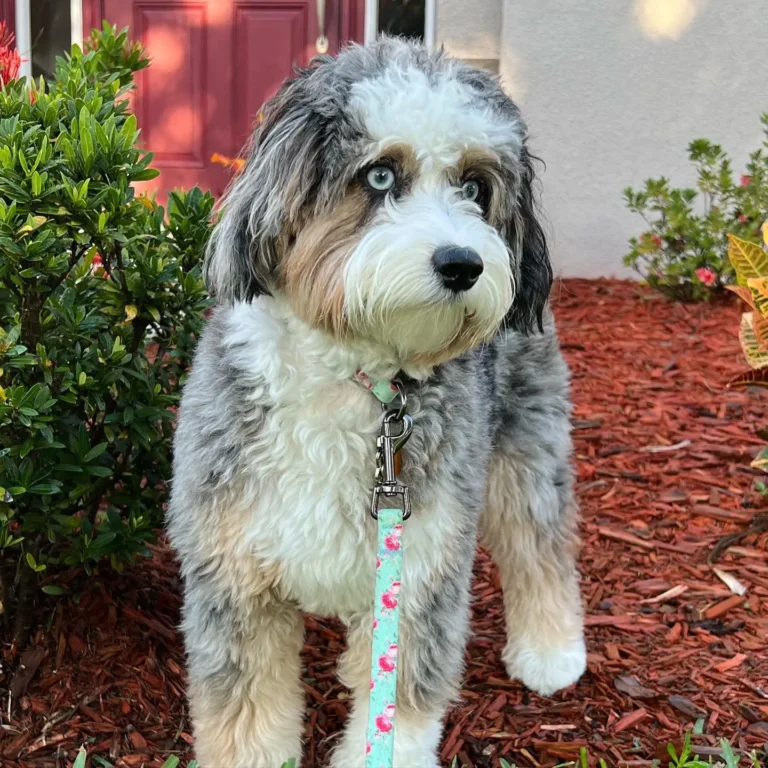Petsay
Mini Aussiedoodles are generally healthy dogs, but like all breeds, they can experience certain health problems. Common issues include hip dysplasia, epilepsy, eye problems, allergies, patellar luxation, and weight management concerns.
While many Mini Aussiedoodles live long, healthy lives, they must be aware of potential health risks and take preventive steps. This guide outlines the common health issues that may affect Mini Aussiedoodles and offers tips for prevention and management.
at petsay
A Mini Aussiedoodle is a mix between a Miniature Australian Shepherd and a Miniature Poodle. They are small, playful, and really smart. Because they come from two intelligent breeds, Mini Aussiedoodles are easy to train and love spending time with people. They usually weigh 10 to 20 pounds, making them perfect for families or people who want a small, active dog. Their size and personality make them great companions for both kids and adults!
Elbow dysplasia is a condition that affects a dog’s elbow joint. It happens when the bones in the elbow do not fit together correctly. This can cause pain and make it hard for the dog to walk. It mostly affects medium to large dogs like Labrador Retrievers, German Shepherds, and Basset Hounds.
Elbow dysplasia is mostly genetic, meaning dogs can inherit it from their parents. Other causes include:
If a puppy’s bones don’t grow properly, it puts extra pressure on the joint, which gets worse over time.
There are four main conditions that can cause elbow dysplasia:
Elbow dysplasia is a condition that affects a dog’s elbow joint. It happens when the bones in the elbow do not fit together correctly. This can cause pain and make it hard for the dog to walk. It mostly affects medium to large dogs like Labrador Retrievers, German Shepherds, and Basset Hounds.
Elbow dysplasia is mostly genetic, meaning dogs can inherit it from their parents. Other causes include:
If a puppy’s bones don’t grow properly, it puts extra pressure on the joint, which gets worse over time.
There are four main conditions that can cause elbow dysplasia:
Hip dysplasia can affect Aussiedoodles just like other dogs, especially if they are larger. It happens when the hip joint doesn’t fit together properly, making it loose and causing pain or stiffness. Signs of hip dysplasia in Aussiedoodles include:
Hip dysplasia in Aussiedoodles can be caused by genetics, fast growth, poor diet, or being overweight. Treatments include surgeries like FHO or total hip replacement to reduce pain. Regular vet check-ups, a healthy diet, and proper exercise can help prevent it.

Epilepsy can affect Aussiedoodles and cause seizures due to problems in the brain. Some seizures, like focal seizures, cause twitching in the face without passing out. Before a seizure, your Aussiedoodle might act scared or worried. Since Poodles and Australian Shepherds (Aussiedoodle parents) can have epilepsy, Aussiedoodles might get it, too. Treatment is medicine to control seizures, and your dog will need it for life. Never stop the medicine suddenly, as it can cause more seizures.

Aussiedoodles can have eye problems that need care. Eye infections happen from bacteria, viruses, or injuries. Signs are red eyes, discharge, and squinting. Dry eye happens when their eyes don’t make enough tears, causing dirt to build up. Artificial tears or vet medicine can help. Cataracts make eyes cloudy and hard to see, often caused by aging or diabetes, and surgery may be needed. Glaucoma is when pressure builds in the eye and can cause blindness. Signs are redness and cloudiness. Corneal ulcers are eye injuries causing tearing, blinking, or rubbing. Conjunctivitis (pink eye) makes eyes red, watery, and sticky. Regular vet visits can help find and treat these problems early.
Check their eyes regularly in good light. Eyes should look clear, with bright irises and no redness. If your Aussiedoodle blinks a lot or their eyes seem irritated, take them to the vet early to stop problems from getting worse.
Aussiedoodles can have allergies caused by things like pollen, mold, dust, certain foods, fleas, or grooming products. Signs include itchy skin, sneezing, paw licking, runny eyes, or upset stomach. To manage allergies, reduce exposure to allergens, groom regularly, and use hypoallergenic products. Your vet may suggest medication like antihistamines or even allergy vaccines for treatment.
Mini Aussiedoodles often experience allergies that can cause itchy skin, breathing issues, or ear infections.
Regular grooming, hypoallergenic products, and vet care can help manage these allergies effectively.
Patellar luxation, or a dislocated knee, is a condition where the kneecap moves out of place. It can affect one or both knees and cause pain and difficulty moving.
Mini Aussiedoodles are typically healthy dogs but can be prone to health issues like hip dysplasia, epilepsy, eye problems, allergies, and patellar luxation. To keep your Mini Aussiedoodle healthy: